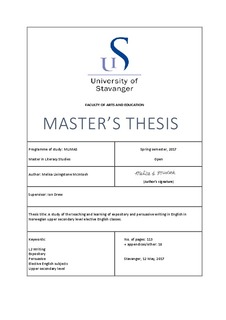| dc.description.abstract | This qualitative case study investigates the teaching and learning of writing in English in Norwegian upper secondary level elective English classes, namely International English, Social Studies English and English Literature and Culture, with a focus on expository and persuasive writing. According to a report by Lødding and Aamodt (2015), university students in Norway struggle to write academic texts. The aim was to find out to what extent and how expository and persuasive writing was taught in the elective English subjects in the light of poor writing skills reported amongst first year university students. It was also to find out how the students experienced the teaching of writing and expository and persuasive writing.
The case study comprised five upper secondary schools in Rogaland county. The subjects were five English teachers and a sample of their students. Including both the teachers’ and the students’ perspectives increased the validity of the study. The study used two different methods, namely semi-structured interviews with the teachers and focus-group interviews with the students. The data included information about how the students were instructed in writing expository and persuasive texts, their strategies when writing, the feedback they received, and how they were assessed.
The teacher interviews revealed that only one of the five teachers explicitly taught expository and persuasive writing. The other teachers taught the essay or the five-paragraph essay, which supports the findings of Horverak (2015). Most of the interviewed teachers taught the essay instead of expository and persuasive writing in order to make writing easier for their students. Other findings were that the teachers seemed to focus on the structure of the text when teaching writing and the majority of the students deployed writing strategies that were related to this. Furthermore, the norm was for the teachers to give written post-product feedback. None of the students had participated in process writing thus far in the course, thus supporting the studies of Bø (2014) and Vik (2013), who found that process writing was seldom practised in English at the upper secondary level. In terms of feedback, there was a discrepancy between the teachers, on the one hand, who claimed that they gave extensive feedback, and many students, on the other hand, who felt that the feedback lacked specificity and depth. All the teachers used example texts when instructing writing, which was deemed beneficial and valuable by the students.
This thesis has added to the research on English writing at the upper secondary level in Norway, with its focus on expository and persuasive writing in the elective English classes. It has provided insight into how writing is instructed at this level of English in the sample schools, from the perspectives of both the teachers and students, and this contributes to understanding how writing is taught in the elective English classes. | nb_NO |
